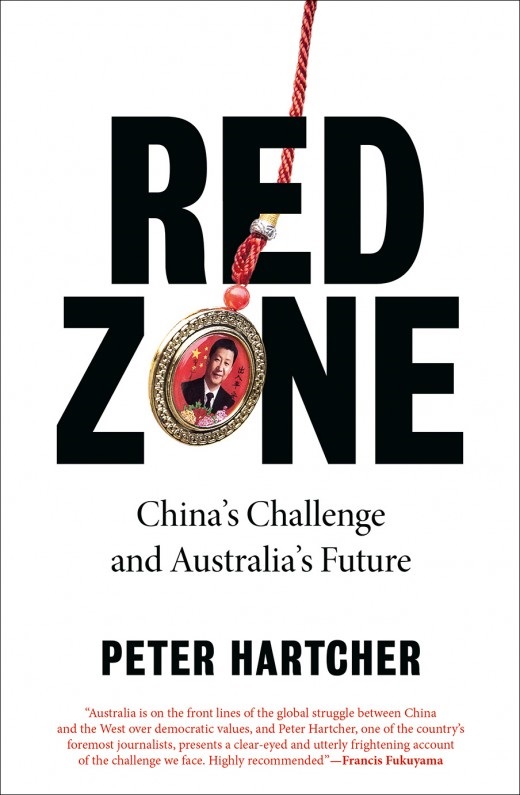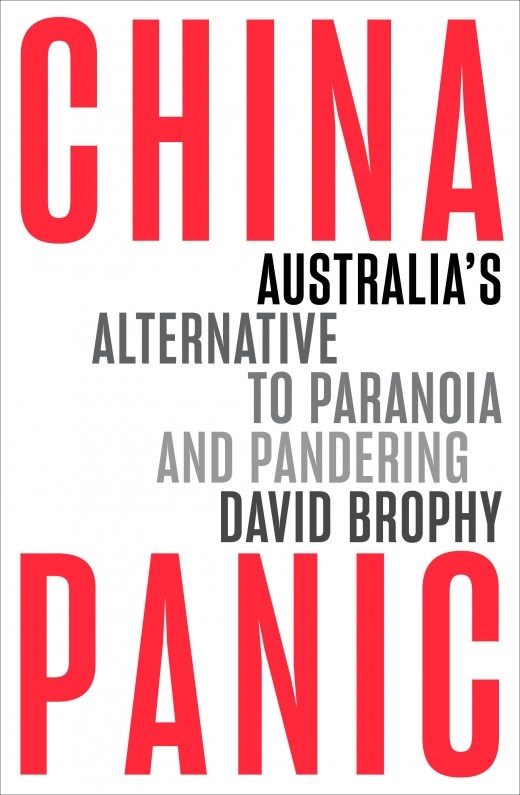Book Reviews
- Peter Hartcher Red Zone: China’s Challenge and Australia’s Future (Black Inc., 2021)
- David Brophy China Panic: Australia’s Alternative to Paranoia and Pandering (La Trobe University Press, 2021)
If you wanted to give a political outsider a sense of Australia’s China debate in 2021, you could do a lot worse than to give them these two books. I would stress that it is necessary to offer both books, because they come from opposite sides of the debate. But read together, they convey the arguments that divide Australia’s politicians, commentators and sometimes the public pretty well.
Despite the clear differences between Hartcher and Brophy’s arguments (they debated each other on ABC Radio recently), it’s not easy to find matching labels for them. Pro-China and anti-China? Not really. Hartcher is much more critical of Beijing, while Brophy tends to find more fault with Australia and the United States, but both see the growing might of China as a problem for Australia, and neither tries to evade or downplay China’s sins.
 Left-wing and right-wing? Brophy is clearly from the left (“Ultimately, I see the dynamics of capitalist competition as responsible for the US-China rivalry”), but Hartcher’s ideological argument is really a defence of liberalism (that is, a defence of democracy and individual freedom) rather than conservatism, although I grant those two categories can be hard to distinguish.
Left-wing and right-wing? Brophy is clearly from the left (“Ultimately, I see the dynamics of capitalist competition as responsible for the US-China rivalry”), but Hartcher’s ideological argument is really a defence of liberalism (that is, a defence of democracy and individual freedom) rather than conservatism, although I grant those two categories can be hard to distinguish.
Hawk versus dove? Perhaps, in that Brophy opposes what he regards as Washington’s aggressive militarism, whereas Hartcher encourages Australia to spend a lot more on defence and on efforts to curb Chinese spying and political interference.
Panic versus complacency? You suspect the authors would pin these labels on each other, and Brophy in particular would have a point because Hartcher’s book is undeniably hyperbolic. He calls China an “existential threat” and a “hostile state” engaged in a “drive for dominance”. Is Brophy complacent about China? Not really, but he is reluctant to endorse action that would prevent the worst from happening. Should China ever invade Taiwan, Brophy says, Australia should respond with “demonstrations, strikes and coordinated international action”. In other words, Australia would do nothing effectual.

Still, read in isolation, that quote suggests an out-of-touch academic who doesn’t understand how the world works, which is not at all a fair summary of the tone of China Panic. If anything, of the two authors, it is Brophy who shows more realist sobriety, reminding the reader regularly that all great powers will use their strength to coerce weaker players.
The other strength of Brophy’s approach is that he is constantly looking at Australian (and US) behaviour with the same intense critical gaze that Hartcher applies to China. It’s a valuable mental habit for anyone involved in this debate because it creates the capacity for empathy, an ability to see the other side’s perspective even if you don’t share it.
Hartcher’s book would have benefitted from more of this self-critical gaze. For instance, with a few superficial changes, this passage on China’s boundless appetite for security could just as easily be applied to the US military-industrial complex:
You cannot reassure a paranoid person that he or she is secure; nor can you reassure a paranoid political party-state that it is safe. Its systems and policies are structured to expand endlessly. Under this mindset, the greater China’s reach, the greater its ability to protect itself. So it must not stop reaching.
Yet looking in the mirror won’t make much difference to the objective situation, if that’s all Australia does. Brophy’s repeated calls for self-reflection and self-criticism are welcome, but when he says “there’s no point telling China to stop playing power politics in the South Pacific if Australia’s side is doing the same thing”, he over-reaches. Brophy’s worldview makes it hard for him to endorse the idea that Australia should be playing power politics at all, but as distasteful as he might regard it, there’s no obvious alternative.
Brophy’s book offers no real solution to the dilemma exposed by China’s economic and diplomatic pressure campaign of recent years: what is Australia willing to do, what price is it willing to pay, to maintain the ability to make decisions about issues that affect China’s interest without succumbing to coercion from Beijing? It is true, as Brophy reminds us, that coercion is inevitable in international affairs, and Australia is often subject to it even from its allies. But that doesn’t mean Australia can avoid the question of the limits it wishes to set on such behaviour.
China might be a bully, but it is a cautious bully that doesn’t take too many chances with its economy.
Hartcher does offer solutions, but they’re not persuasive because his analysis is too partial. He writes about China’s so-called debt-trap diplomacy without acknowledging that this thesis has been repeatedly questioned. He says Australia is economically dependent on China, but that claim too is questionable. And he recommends economic diversification without acknowledging the possibility that this might make Beijing less restrained because it will have less to lose. China might be a bully, but it is a cautious bully that doesn’t take too many chances with its economy. As George Mason University researcher Ketian Zhang recently argued (albeit tentatively),when China was more dependent on Australian liquefied natural gas exports in the early part of this century, it engaged in fewer acts of coercion.
Clearly, I have complaints about both these volumes. But it’s worth closing on the slightly unfashionable point that these two polemics demonstrate the relative sophistication of Australia’s China debate. In any major public controversy in Australia, someone will pop up to bemoan the quality of the debate. But that’s a kind of snobbery, really, consigning the rough and tumble business of political persuasion, which has never in history met the Socratic ideal that the scolds have in their heads, to a lower class of activity. There are no perfect answers in politics, and no Olympian heights from which policymakers can observe events with perfect objectivity. They have to think and act in real time, with imperfect information and doing their best to correct for biases. Books like these, especially when read together, help that process.

